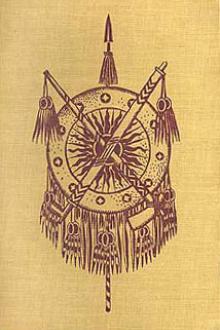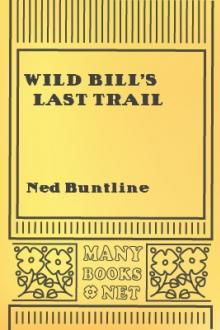The Hidden Children, Robert W. Chambers [e book reader free .txt] 📗

- Author: Robert W. Chambers
Book online «The Hidden Children, Robert W. Chambers [e book reader free .txt] 📗». Author Robert W. Chambers
The Oneida said it was because the Iroquois had no quarrel with Penn's people, who themselves disliked the intruding Yankee and New Yorker; but they were infuriated against us because we had driven the Iroquois from their New York lands and had punished them so dreadfully at Oriskany. And he further said that Cherry Valley would not have been made such a shambles except that Colonel Clyde and Colonel Campbell lived there, who had done them so much injury at Oriskany.
I myself thought that this was the truth, for no Iroquois ever forgave us Oriskany; and what we were now about to do to them must forever leave an implacable and unquenchable hatred between the Long House and the people of New York.
For on this river which we now followed, and between us and Tioga, where our main army lay, were the pretty Iroquois towns, Ingaren, Owaga, Chenang, and Owega, with their well-built and well-cellared houses, their tanneries, mills, fields of corn and potatoes, orchards, and pleasant gardens full of watermelons, muskmelons, peas, beans, squashes—in fact, everything growing that might ornament the estate of a proud man of my own colour. Thus had the Mohican described these towns to me. And now, as I sat weary, thinking, I knew that even before our army at Otsego joined the Tioga army, it would utterly destroy these towns on its way down; ruin the fields, and burn and girdle the orchards.
And this was not even the beginning of our destined march of destruction and death from one end of the Long House to the other!
Now our Oneida crept back to us, saying that the river was so low we could cross up to our arm-pits; and stood there naked, a slender and perfect statue, all adrip, and balancing pack and rifle on his head.
Wearily we picked our way down to the willows, stripped, hoisted rifles and packs, and went into the icy water. It seemed almost impossible for me to find courage and energy to dress, even after that chilling and invigorating plunge; but at last I was into my moccasins and shirt again. The Sagamore strode lightly to the lead; the Wyandotte started for the rear, but I shoved him next to the Mohican and in front of me, hating him suddenly, so abrupt and profound was my conviction that his stupidity was a studied treachery and not the consequences of a loutish mind.
"That is your place," I said sharply.
"You gave no orders."
"Nor did I rescind my last order, which was that you march behind the Sagamore."
"Is that to be the order of march?" he asked.
"What do you mean by questioning your officer?" I demanded.
"I am no soldier, but an Indian!" he said sullenly.
"You are employed and paid as a guide by General Sullivan, are you not? Very well. Then obey my orders to the letter, or I'll put you under arrest!"
That was not the way to talk to any Indian; but such a great loathing and contempt far this Wyandotte had seized me, so certain in my mind was I that he was disloyal and that every stupid act of his had been done a-purpose, that I could scarce control my desire to take him by that thick, bull-throat of his and kick him into the river.
For every stupid act or omission of his—or any single one of them—might yet send us all to our deaths. And their aggregate now incensed me; for I could not see how we were entirely to escape their consequences.
Again and again I was on the point of ordering a halt and having the fellow tried; but I dreaded the effect of such summary proceedings on the Oneidas and the Stockbridge, whose sense of justice was keen, and who might view with alarm such punishment meted out to mere stupidity.
It was very evident that neither they nor my Mohican had come to any definite conclusion concerning the Wyandotte. And until they did so, and until I had the unerring authority of my Indians' opinions, I did not care to go on record as either a brutal or a hasty officer. Indians entertain profound contempt for the man who arrives hastily and lightly at conclusions, without permitting himself leisure for deep and dignified reflection.
And I was well aware that with these Indians the success of any enterprise depended entirely upon their opinion of me, upon my personal influence with them.
Dawn was breaking before the Sagamore turned his head toward me. I gave the signal to halt.
"The Ouleout," whispered Tahoontowhee in my ear. "Here is its confluence with the Susquehanna."
The Mohican nodded, saying that we now stood on a peninsula.
I tried to make out the character of the hillock where we stood, but it was not yet light enough to see whether the place was capable of defence, although it would seem to be, having two streams to flank it.
"Sagamore," said I, "you and I will stand guard for the first two hours. Sleep, you others."
One after another unrolled his blanket and dropped where he stood. The Mohican came quietly toward me and sat down to watch the Susquehanna, his rifle across his knees. As for me, I dared not sit, much less lie flat, for fear sleep would overpower me. So I leaned against a rock, resting heavily on my rifle, and strained my sleepy eyes toward the invisible Ouleout. A level stream of mist, slowly whitening, marked its course; and "The Voice that Continues" sounded dreamily among the trees that bordered its shallow flood of crystal.
Toward sunrise I caught the first glimmer of water; in fact, so near was I that I could hear the feeding trout splashing along the reaches, and the deer, one by one, retreating from the shore.
Birds that haunt woodland edges were singing, spite of their moulting fever; and I heard the Scarlet Tanager, the sweet call of the Crimson Cardinal, the peeping of the Recollet chasing gnats above the water, the lovely, linked notes of the White-throat trailing to a minor infinitely prolonged.
Greyer, greyer grew the woods; louder sang the birds; suddenly a dazzling shaft of pink struck the forest; the first shred of mist curled, detached itself, and floated slowly upward. The sun had risen.
Against the blinding glory, looming gigantic in the mist, I saw the Sagamore, an awful apparition in his paint, turn to salute the rising sun. Then, the mysterious office of his priesthood done, he lifted his rifle, tossed the heavy piece lightly to his shoulder, and strode toward me.
I shook the sleeping Oneidas, and, as they sprang to their feet, I pointed out their posts to them, laid my rifle on my sack, and dropped where I stood like a lump of lead.
I was aroused toward nine by the Mohican, and sat up as wide awake as a disturbed tree-cat, instantly ready for trouble.
"An Oneida on the Ouleout," he said.
"Where?"
"Yonder—just across."
"Friendly?"
"He has made the sign."
"An ambassador?"
"A runner, not a belt-bearer."
"Bring him to me."
Strung along the banks of the Ouleout, each behind a tree, I saw my Indians crouching, rifles ready. Then, on the farther bank, at the water's shallow edge, I saw the strange Indian—a tall, spare young fellow, absolutely naked except clout, ankle moccasins, hatchet-girdle, and pouch; and wearing no paint except a white disc on his forehead the size of a shilling. A single ragged frond hung from his scalp lock.
Answering the signal of the Mohican, he sprang lightly into the stream and crossed the shallow water. My Oneidas seemed to know him, for they accosted him smilingly, and Tahoontowhee turned and accompanied him back toward the spot where I was standing, naively exhibiting to the stranger his first scalp. Which seemed to please the dusty and brier-torn runner, for he was all smiles and animation until he caught sight of me. Then instantly the mask of blankness smoothed his features, so that when I confronted him he was utterly without expression.
I held out my hand, saying quietly:
"Welcome, brother."
"I thank my brother for his welcome," he said, taking my offered hand.
"My brother is hungry," I said. "He shall eat. He is weary because he has came a long distance. He shall rest unquestioned." I seated myself and motioned him to follow my example.
The tall, lank fellow looked earnestly at me; Tahoontowhee lighted a pipe, drew a deep, full inhalation from it, passed it to me. I drew twice, passed it to the runner. Then Tahoontowhee laid a square of bark on the stranger's knees; I poured on it from my sack a little parched corn, well salted, and laid beside it a bit of dry and twisted meat. Tahoontowhee did the same. Then, very gravely and in silence we ate our morning meal with this stranger, as though he had been a friend of many years.
"The birds sing sweetly," observed Tahoontowhee politely.
"The weather is fine," said I urbanely.
"The Master of Life pities the world He fashioned. All should give thanks to Him at sunrise," said the runner quietly.
The brief meal ended, Tahoontowhee laid his sack for a pillow; the strange Oneida stretched out on the ground, laid his dusty head on it, and closed his eyes. The next moment he opened them and rose to his feet. The ceremony and hospitality devolving upon me had been formally and perfectly accomplished.
As I rose, free now to question him without losing dignity in his eyes, he slipped the pouch he wore around in front, where his heavy knife and hatchet hung, and drew from it some letters.
Holding these unopened in my hand, I asked him who he was and from whom and whence he came.
"I am Red Wings, a Thaowethon Oneida of Ironderoga, runner for General Clinton—and my credentials are this wampum string, so that you shall know that I speak the truth!" And he whipped a string of red and black wampum from his pouch and handed it to me.
Holding the shining coil in my hands, I looked at him searchingly.
"By what path did you come?"
"By no path. I left Otsego as you left, crossed the river where you had crossed, recrossed where you did not recross, but where a canoe had landed."
"And then?"
"I saw the Mengwe," he said politely, as the Sagamore came up beside him.
Mayaro smiled his appreciation of the Algonquin term, then he spat, saying:
"The Mengwe were Sinako and Mowawak. One has joined the Eel Clan."
"The Red Wings saw him. The Cat-People of the Sinako sat in a circle around that scalpless thing and sang like catamounts over their dead!"
It is impossible to convey the scorn, contempt, insult, and loathing expressed by the Mohican and the Oneida, unless one truly understand the subtlety of the words they used in speaking of their common enemies.
"The Red Wings came by the Charlotte River?" I asked.
"By the Cherry, Quenevas, and Charlotte to the Ouleout. The Mengwe fired on me as I stood on a high cliff and mocked them."
"Did they follow you?"
"Can my brother Loskiel trail feathered wings through the high air paths? A little way I let them follow, then took wing, leaving them to whine and squall on the Susquehanna."
"And Butler and McDonald?" I demanded, smiling.
"I do not know. I saw white men's tracks on the Charlotte, not two hours old. They pointed toward the Delaware. The Minisink lies there."
I nodded. "Now let the Red Wings fold his feathers and go to rest," I said, "until I have read my letters and considered them."
The Oneida immediately threw himself on the ground and drew his pouch under his head. Before I could open my first letter, he was asleep and breathing quietly as a child. And, on his naked shoulder, I saw a smear of balsam plastered over with a hazel leaf, where a bullet had left its furrow. He had not even mentioned that he had been hit.
The first letter was from my General Clinton:
"Have a





Comments (0)